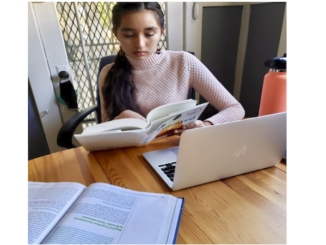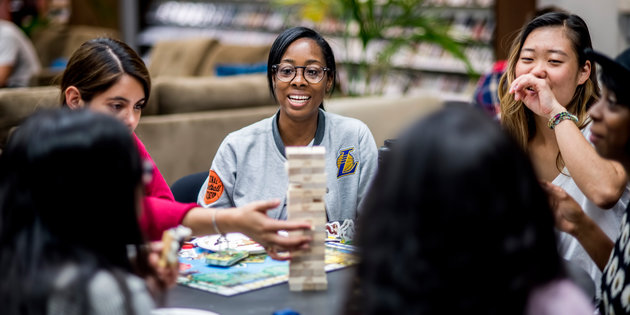
Traveling has become a controversial thing to do during the pandemic, and Pepperdine students and faculty have clashing views.
While some students have traveled for fun, others have traveled only for essential reasons, and many have not traveled at all. These different choices can lead to judgement and disagreement.
“We won’t be able to keep our freedom if we aren’t responsible at the same time,” said Ken Waters, a journalism professor who teaches communication ethics. “You’re free to go get COVID-19, you’re free to kill your grandmother, but is that the responsible thing to do? Is that the right thing to do? Probably not. That argument, I think, has gotten lost with some people who have been traveling over the last year.”
Students and professors agreed people need to consider many variables before deciding to travel, such as their reasons, local and destination restrictions, transportation methods, their age and health. As students and faculty share their perspectives on traveling, health experts and ethicists weigh the pros, cons and ethics of traveling during COVID-19.
Doctors’ take on travel
Dr. Alberto Chueca, a pediatrician at Delgado Clinic, said only essential travel should happen.
“If it’s an emergency or it’s impossible to delay travel, then you must travel,” Chueca said. “But it’s important that people understand they don’t have to travel just to have fun or visit relatives; they have to stay home as much as possible.”
Restrictions vary based on where a person lives, and most restrictions follow an honor code as they are difficult to enforce.
“Essential travel includes work and study, critical infrastructure support, economic services and supply chains, health, immediate medical care, and safety and security,” said Dr. Andrew Aiello, physician at Pepperdine Student Health Center.
There have been five well-documented flights where mass transmission occurred and over 2,000 flights with known COVID-19 cases on board, Aisha Khatib and his fellow researchers wrote in a Nov. 2 Journal of Travel Medicine review.
“Health officials are recommending individuals to not travel to prevent the further spread of COVID-19,” Aiello said.
Traveling for leisure
Waters said people weigh the ethics of travel differently during the pandemic because of a “free will” mentality.
“One of the arguments that people make for ‘I’m going to travel’ and ‘I’m going to do what I want’ is ‘I have the freedom to do this; America is a free country,’” Waters said. “Well, freedom only survives if you also have responsibility. It’s different sides of the same coin.”
Sophomore mathematics major Mikela De La Flor said she traveled for leisure but took necessary precautions. Based in Lima, Peru, she traveled to the Virgin Islands, Miami, Orlando and Mancora, Peru. De La Flor thinks traveling depends on many factors and that COVID-19 shouldn’t be a reason to stop enjoying it.
“I think it depends on the state that your country is in, or the country you’re going to … also on the precautions that you take,” De La Flor said. “But you can’t just pause your whole life because of the pandemic, especially after so long.”
De La Flor said an important part of her mindset comes from the fact that she’s healthy and not at risk.
“I don’t know how things would be if I had a pre-existing condition that would make it harder for me if I got the virus,” De La Flor said.
Others who traveled for pleasure were Daniela Torrado, freshman psychology major, and Mauricio Contreras, a sophomore finance and economics major. Torrado traveled from Mexico to Spain during the pandemic and is currently taking a gap semester volunteering in Costa Rica.
“I’m not a big COVID-19 scared person,” Torrado said. “I think it depends on the person and what they have as second-hand sicknesses and risks, but traveling is traveling.”
Contreras said cheap flight tickets were a big factor that influenced his decision to travel from Lima to Mancora in Peru.
“The reason I wanted to go [travel] on New Year’s Eve was because the tickets were really cheap,” Contreras said. “They were like 50% [off]. That’s why I got the deal.”
Essential travel
Sociology Professor Charles Hall traveled from Thousand Oaks, California, to Mobile, Alabama, for a family emergency.
“I would’ve had an ethical problem if I had got on a plane just for pleasure,” Hall said. “The only reason I got on a plane was that my mom needed me there to help, so I weighed the risk factors and felt like the right thing to do was go see her.”
Hall was concerned about the seating arrangements on the plane. He ensured that the seat next to him wasn’t booked and practiced social distancing with his parents upon arrival.
Isabella Cerna, freshman international business major, traveled from Managua, Nicaragua, to Denver, Colorado, with her family. Her mom was pregnant and was scheduled to give birth there, so that’s where they quarantined.
“[Being in Denver] was basically the same as being in our house in Managua because we’d bring all our groceries from Managua so we wouldn’t go shopping there,” Cerna said. “I couldn’t say I got to know Denver that much because I was limited to the house we were staying at.”
Cerna recently moved away from family in Nicaragua to California for her visa and for the chance to attend classes in person.
“I [now] feel less responsible for my dad who is diabetic, my mom was pregnant,” Cerna said. “… [Now] we have a new born baby in the house, so it’s important that none of us get sick.”
Some students have to travel for athletic competitions. Kira Graves, freshman psychology major and track athlete, said she only travels for training and competitions. She is solely exposed to her coach and teammates and said she wouldn’t travel for leisure during a pandemic.
“In Santa Barbara, we didn’t really go anywhere other than the track meet,” Graves said. “We were required to stay in our little tent with our people, so it felt relatively safe. The only time we ended up taking off our masks was when we were running.”
No travel
Located in San Jose, California, freshman biology major Rachel Jiang said she hasn’t traveled more than 20 miles from home and disapproves of leisure travel.
“I’m a little worried and sometimes frustrated depending on the intent [of travel],” Jiang said. “If you’re just traveling for fun, then I don’t think that’s very responsible.”
Jiang said she’s willing to wait to travel safely. She believes that if people limit their travel, the pandemic would end faster.
“One of the main reasons why the virus is traveling between places … is because of traveling and being unsafe,” Jiang said.
Analysis of ethical reasoning
Waters thinks traveling for fun, especially with no safety measures, is a problem.
“I do have a problem, and I think most ethicists would have … with spring break and Miami that happened … no masks, just party,” Waters said. “… We know about some of it because people have gotten sick and passed on COVID-19, not just to each other, but to other people who are vulnerable, to parents, grandparents, teachers, and that’s really selfish.”
Waters said humans owe each other courtesy and safety, they should care about others as much as themselves.
“You’re just not being a responsible human being at this point in time,” Waters said. “I understand that some people have a need to be in perpetual motion and travel is very helpful for their psyche and emotions, but that doesn’t mean you can’t find other ways to get your movement.”
For essential travel, Water said he would only ask the question ‘Is this really essential travel?’ And that he had great respect for non-travelers.
Waters traveled to help his wife’s ill mother move from Northern California to Washington state. He said they felt the ethical justification to travel because it allowed his mother-in-law to be closer to a family member who could help care for her.
Effects on travel market
Since the beginning of the pandemic in March, travel spending declined by 42% and resulted in $492 billion in cumulative losses for the U.S. travel economy, according to the U.S. Travel Association.
However, 45% of 1,300 Americans surveyed have taken trips since the start of the pandemic, Melanie Lieberman wrote in a Feb. 3 The Points Guy article.
Almost half of Americans (49%) said their willingness to get vaccinated is influenced by their desire to travel, Lieberman wrote.
However, even after vaccination, people are at risk of getting infected and spreading the virus.
“Now that I am vaccinated, this [infection] is less of a concern; however, I still must remain cautious as additional COVID-19 variants may present,” Aiello said.
Chueca said he believes vaccination will be mandatory to travel in the near future.
“The only thing that could stop this pandemic is the vaccine, and as soon as we can, we all have to be vaccinated, because if the vaccination schedule takes too long, the virus will have some new strains and mutations, which could make vaccines, or most of them, ineffective.”
Inevitable travel and safety
If travel is inevitable, Chueca said the traveler needs to follow a protocol before the date of departure.
“First of all you’ve got to be prepared for traveling,” Chueca said. “Staying home for at least one week, with no contact to other people.”
All air passengers coming to the United States, including U.S. citizens, are required to have a negative COVID-19 test result or documentation of recovery, the Centers for Disease Control and Prevention wrote in an updated Feb. 16 CDC website advisory.
“You have to wash your hands very frequently, you have to use your mask covering your nose, mouth and chin,” Chueca said. “After that, keep your distance, do not go into crowded or closed places like restaurants or bars, you have to be in open places.”
Remaining seated through the entire flight, “reduces the chances of random physical contact and disturbs less the cabin ventilation pattern that tends to prevent air from flowing lengthwise along the cabin,” Rui Pombal, medical director of the Aviation Medicine Centre, told the American Medical Association.
Furthermore, it’s important to take into consideration which airlines continue to block middle seats, Elaine Glusac wrote in a Dec. 3 New York Times article and to follow the CDC recommendations on destinations to avoid.
Camila Velayos completed the reporting for this story under the supervision of Dr. Christina Littlefield and Dr. Theresa de los Santos in Jour 241 in Spring 2021. Dr. Littlefield supervised the web story.



